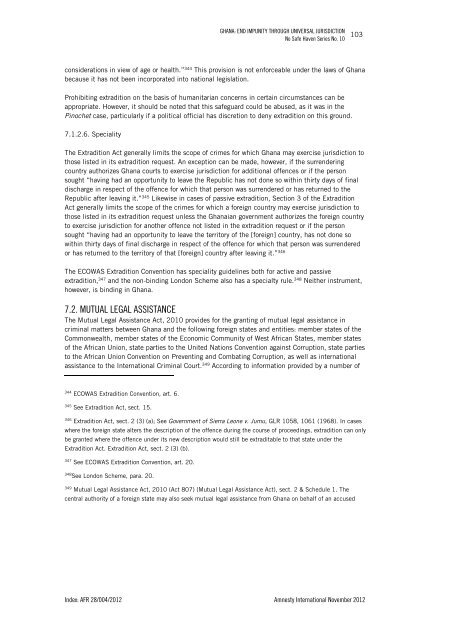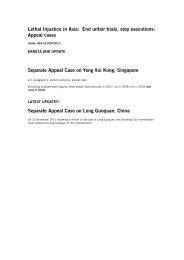Ghana - Amnesty International
Ghana - Amnesty International
Ghana - Amnesty International
Create successful ePaper yourself
Turn your PDF publications into a flip-book with our unique Google optimized e-Paper software.
GHANA: END IMPUNITY THROUGH UNIVERSAL JURISDICTIONNo Safe Haven Series No. 10103considerations in view of age or health.” 344 This provision is not enforceable under the laws of <strong>Ghana</strong>because it has not been incorporated into national legislation.Prohibiting extradition on the basis of humanitarian concerns in certain circumstances can beappropriate. However, it should be noted that this safeguard could be abused, as it was in thePinochet case, particularly if a political official has discretion to deny extradition on this ground.7.1.2.6. SpecialityThe Extradition Act generally limits the scope of crimes for which <strong>Ghana</strong> may exercise jurisdiction tothose listed in its extradition request. An exception can be made, however, if the surrenderingcountry authorizes <strong>Ghana</strong> courts to exercise jurisdiction for additional offences or if the personsought “having had an opportunity to leave the Republic has not done so within thirty days of finaldischarge in respect of the offence for which that person was surrendered or has returned to theRepublic after leaving it.” 345 Likewise in cases of passive extradition, Section 3 of the ExtraditionAct generally limits the scope of the crimes for which a foreign country may exercise jurisdiction tothose listed in its extradition request unless the <strong>Ghana</strong>ian government authorizes the foreign countryto exercise jurisdiction for another offence not listed in the extradition request or if the personsought “having had an opportunity to leave the territory of the [foreign] country, has not done sowithin thirty days of final discharge in respect of the offence for which that person was surrenderedor has returned to the territory of that [foreign] country after leaving it.” 346The ECOWAS Extradition Convention has speciality guidelines both for active and passiveextradition, 347 and the non-binding London Scheme also has a specialty rule. 348 Neither instrument,however, is binding in <strong>Ghana</strong>.7.2. MUTUAL LEGAL ASSISTANCEThe Mutual Legal Assistance Act, 2010 provides for the granting of mutual legal assistance incriminal matters between <strong>Ghana</strong> and the following foreign states and entities: member states of theCommonwealth, member states of the Economic Community of West African States, member statesof the African Union, state parties to the United Nations Convention against Corruption, state partiesto the African Union Convention on Preventing and Combating Corruption, as well as internationalassistance to the <strong>International</strong> Criminal Court. 349 According to information provided by a number of344ECOWAS Extradition Convention, art. 6.345See Extradition Act, sect. 15.346Extradition Act, sect. 2 (3) (a); See Government of Sierra Leone v. Jumu, GLR 1058, 1061 (1968). In caseswhere the foreign state alters the description of the offence during the course of proceedings, extradition can onlybe granted where the offence under its new description would still be extraditable to that state under theExtradition Act. Extradition Act, sect. 2 (3) (b).347See ECOWAS Extradition Convention, art. 20.348 See London Scheme, para. 20.349Mutual Legal Assistance Act, 2010 (Act 807) (Mutual Legal Assistance Act), sect. 2 & Schedule 1. Thecentral authority of a foreign state may also seek mutual legal assistance from <strong>Ghana</strong> on behalf of an accusedIndex: AFR 28/004/2012 <strong>Amnesty</strong> <strong>International</strong> November 2012
















